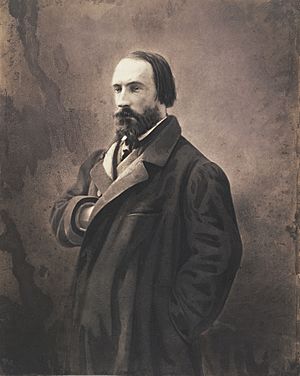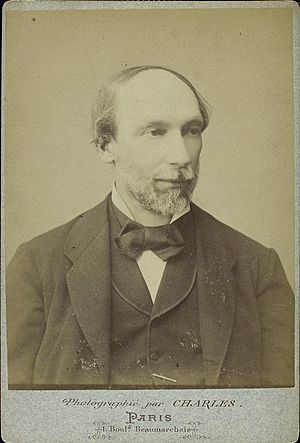Auguste Vacquerie facts for kids
Auguste Vacquerie (1819–1895) was a French journalist and writer. He was known for his strong support of the famous writer Victor Hugo. Vacquerie wrote many plays, poems, and articles. He also took important photographs of Victor Hugo and his family.
Contents
Auguste Vacquerie's Life
Early Years and Friendship with Victor Hugo
Auguste Vacquerie was born in a town called Villequier, France, on November 19, 1819. From a young age, he greatly admired the famous French writer Victor Hugo. Their families became even closer when Auguste's brother, Charles, married Hugo's daughter, Léopoldine Hugo.
Early Writings
Vacquerie started his writing career with works that fit the "Romantic" style, which was popular at the time. These included a book of poems called L'Enfer de l'esprit (1840). He also helped translate the ancient Greek play Antigone (1844) with his friend Paul Meurice. In 1848, he wrote a play called Tragaldabas.
Journalism and Exile
Auguste Vacquerie was an important writer for a newspaper called L'Événement. When Victor Hugo had to leave France in 1852, Vacquerie went with him to Jersey, an island. During this time, Vacquerie took many photographs of the Hugo family and their friends. These photos are very important today.
In 1869, Vacquerie returned to Paris. He, along with Paul Meurice and others, started a new newspaper called Rappel. This newspaper was against the government at the time. Vacquerie's articles in Rappel sometimes led to legal problems. After 1870, he became the main editor of the newspaper.
Later Works and Legacy
Vacquerie continued to write many different works. These included a comedy play in verse called Souvent homme varie (1859). His play Jean Baudry (1863) was his most successful. He also wrote Aujourd'hui et demain (1875) and Futura (published in 1900). He wrote poems about big ideas like philosophy and helping people.
He collected his plays into one book in 1879 and a collection of his essays in 1885. Auguste Vacquerie passed away in Paris on February 19, 1895.
In the same year he died, a street in Paris was named in his honor. It is called rue Auguste-Vacquerie and is located in the 16th arrondissement of Paris.
 | Lonnie Johnson |
 | Granville Woods |
 | Lewis Howard Latimer |
 | James West |



